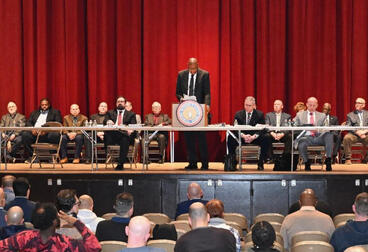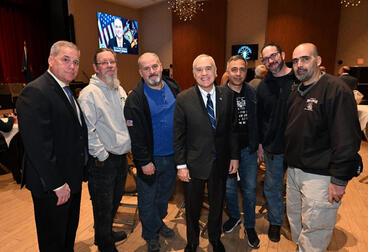The initial shock of the 2016 election results are fading, yet the challenges facing organized labor are more real than ever. Republican majorities exist in two-thirds of the federal government and thirty-six states have Republican governors. The House of Representatives has the Republican majority it needs to pass its agenda without resistance. The Senate has a Republican majority but not the two-thirds leverage it needs to pass unchecked legislation. The White House is secured in Republican hands as president-elect Trump appoints typical establishment Republicans and has embraced lobbyists for his transition team, exactly the people his campaign rallied against. So much for “draining the DC swamp” as Trump so boldly promised. This pattern clarifies that his nominations to the Supreme Court, although judges should be apolitical, will remain strictly adhered to the establishment Republican ideology. What does this mean for organized labor, working class and working poor in America?
Aside from the Friedrichs vs. California Teacher’s Association case that this article will discuss, which coincidentally affects teachers harshly and all members of organized labor unjustly, there will be an immediate surge in the Charter school system. Charter schools and the school voucher program are integral to the Republican Party playbook union-busting strategy. There will also be sustained attempts to abolish the Davis-Bacon Act and Wicks Law. Instead of a progressive agenda to improve the quality of life for the average American, Republican efforts will be focused on people working harder for less.
In 1977 the Supreme Court of the United States heard the case Abood vs. The Detroit Board of Education argue against the agency shop clause, a Michigan state law that mandates public employee union representation, whereas, union members and non-union members protected and represented by the collective bargaining of the union should have to pay union dues (fair share fee) for such services. There have been many precedent cases that have come before the Supreme Court where the court has repeatedly repealed rulings by state courts and decided in favor for paid union representation such as Railway Employees Dept. vs. Hanson (1956) and Machinists vs. Street (1961). It is found consistent that the anti-union workers (the plaintiffs) grieving dues obligation is backed by well-financed conservative business groups. The Railway Employees case argued in Nebraska attacked the rights of railway workers to organize and argued for state’s rights to supersede the Federal law of the 1926 Railway Labor Act. Nebraska has always been a right-to-work state. Case titles can be deceiving. The real agenda of these cases is masked by a name that sounds as if workers are being wronged or private rights are being invaded when in actuality the core principle of the case is to eliminate worker protections so worker’s rights can be curtailed and then exploited.
Without getting too involved in complicated legalese, the plaintiffs claim their First, Fifth, and Fourteenth Amendment rights are violated if they are compelled to pay for union representation and political campaigns that they oppose. In the Abood case, under the Commerce Clause the Supreme Court unanimously held, “‰Û_ that the requirement for financial support of the collective bargaining agency by all who receive the benefits of its work is within the power of Congress under the Commerce Clause, and does not violate either the First or the Fifth Amendments.” Citing the Railway Employees and the Machinists cases, the Federal court ruled in favor of dues obligations by members and non-members represented by the collective bargaining efforts of the democratically elected union representation.
By the time a case reaches the Supreme Court it is because the lower state court rulings have been appealed and then still, the highest court in the land has to decide that the case merits its review. And so the latest case to come before the Supreme Court attacking workers majorities who want union representation is the Friedrichs vs. California Teacher’s Association. Backed by the Libertarian organization The Center for Individual Rights (CIR), nine California public school teachers petitioned the Supreme Court to rehear their grievance against paying dues for union representation. The CIR is a neoconservative law firm that defends individuals against state and federal laws that protect individuals. If that sounds paradoxical, it is.
The timing of the Friedrichs case came before the court after the death of Justice Anthony Scalia. The decision not to rehear the case was split 4-4. For scholars and pundits on both sides of the aisle it is undeniably accepted that Scalia would have been the deciding vote to rehear the case and then rule in favor of eliminating the dues obligation. The United States is a diverse nation with broad issues of concern to many distinct people. This case is the quintessential condition that exposes the importance of who we elect into office. The people of the United States are suffering severe anxiety about their economic standing that has not been seen since after the Great Depression. That recovery demanded action by the U.S. government to implement the New Deal, the FDR Democratic rule of law that gave Americans the Works Progress Administration (WPA) and workers the rights to vote for union representation without employer interference. And here we have a case that will come again before the Supreme Court after a new justice is confirmed who is likely to be a Republican ideologue that will undoubtedly eliminate worker representation rights.
chaotic oppressive environment for all working Americans. Also, the result of the expanded Republican-controlled law-making legislatures will be the rise of diverse cases pursuing anti-labor adjudication coming before the Supreme Court. And with an anti-labor Court filled with confirmed Trump nominations by Republican congressional majorities there will be little to slow the reversal of 70 years of moral labor law protecting worker’s rights

